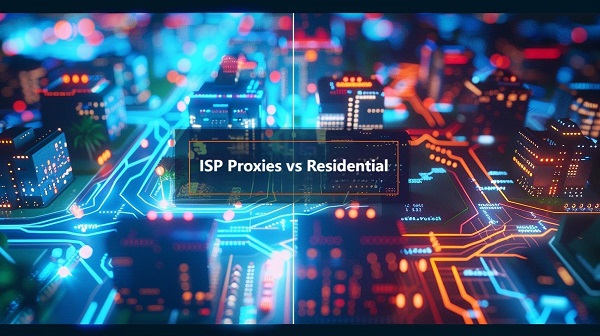How to Scrape LinkedIn Data Efficiently with Proxies
Step‑by‑step guide to bulk scraping LinkedIn using rotating residential proxies.
Post Time:2025-04-11
Detailed comparison between ISP and residential proxies, including features, advantages, and ideal use cases. Help you choose the right proxy type for your needs.
ISP proxies and residential proxies are two popular options to mask IP addresses and access geo-restricted content. What the differences between these two types is a common question, even for not beginners. Actually, they have significant differences in how they function, their advantages, and their best use cases.
In this article, we’ll detail explain the key characteristics of ISP proxies and residential proxies, compare their pros and cons, and provide guidance on when to use each. We hope it can help you understand the differences and choose the right proxy type for your specific needs.

ISP proxies (Internet Service Provider proxies) are a hybrid between datacenter and residential proxies. They are IP addresses assigned by Internet service providers (ISPs), but they are hosted on servers in datacenters. This means an ISP proxy combines the speed and stability of datacenter proxies with the legitimacy of residential proxies.
Internet service providers assign IP addresses to real devices (like home computers or mobile phones). These are residential IP addresses. Residential proxies are tied to actual physical device locations, appearing as legitimate website users.
To better understand the differences between these two proxy types, let’s compare them side by side:
| Feature | ISP Proxies | Residential Proxies |
| Source of IPs | Provided by ISPs but hosted in datacenters. | Assigned to real devices by ISPs. |
| IP Type | Static IPs (rarely change). | Dynamic or rotating IPs. |
| Speed | Faster due to datacenter hosting. | Slower because they rely on real networks. |
| Anonymity | High, but slightly less than residential. | Very high due to real device legitimacy. |
| Geo-Targeting | Limited compared to residential proxies. | Excellent geo-targeting options worldwide. |
| Detection Risk | Low, but higher than residential proxies. | Very low, hard to detect. |
| Cost | More affordable than residential proxies. | Typically more expensive. |
| Best For |
E-commerce bots Social media Web scraping without requiring rotating IPs |
Large-scale Web scraping Ad verification SEO Bypassing geo-restrictions. |
Pros:
Cons:
Pros:
Cons:
The choice between ISP proxies and residential proxies largely depends on your specific use case:
ISP proxies are the perfect choice when:
Residential proxies are the best option when:
Both ISP proxies and residential proxies have their strengths and weaknesses, making them suitable for different tasks. ISP proxies are a hybrid solution offering speed and reliability, while residential proxies provide the highest anonymity level and geo-targeting capabilities.
Specific your needs and choose the right proxy type to improve your operations and tasks. Whether you're managing social media accounts, scraping data, or monitoring SEO performance, there’s a proxy solution tailored for you.
If you’re still unsure which proxy type to choose, consider starting with a proxy provider that offers both ISP and residential options as well as a test chance, so that you can determine the best fit for your needs.
Need help setting up proxies or choosing a provider?
For a detailed setup guide, you can check our blog "How to Use a Proxy for Chrome, iPhone, Android...".
If you want to buy ISP/residential proxies, consider MacroProxy. We have 95M+ real residential ISPs covering 195 countries with precise city-level targeting. Especially 700,000 US IPs. Super high anonymity. 99% success rate. Testing chances before payment and no charge if invalid, for your worry-free purchase. Register and get it today!
< Previous
Next >